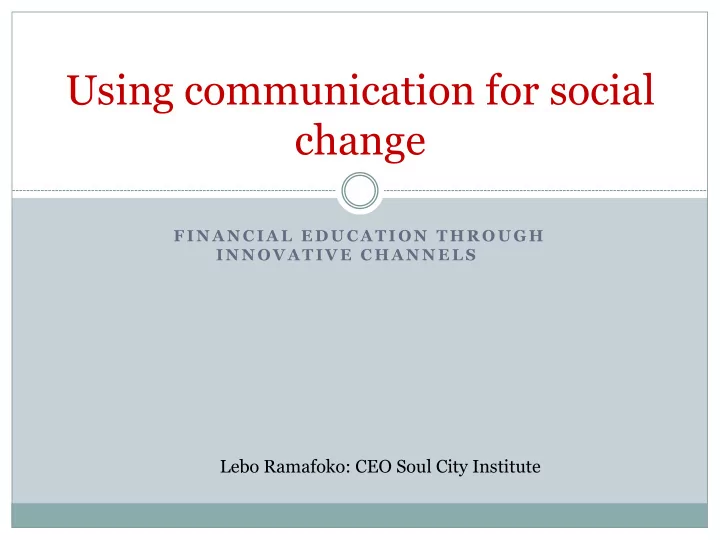

Using communication for social change F I N A N C I A L E D U C A T I O N T H R O U G H I N N O V A T I V E C H A N N E L S Lebo Ramafoko: CEO Soul City Institute
Soul City Institute for Health and Development Communication A South African based NGO, operating regionally Mass media, edutainment to promote health and development Supported by Advocacy and Social Mobilisation that includes School and Community Based Outreach Activities Reaches over 27 million South African children, youth and adults Adapted in 9 countries in Southern Africa
The role of communication in social change Change not linear process Behaviour is the product of interactions between components of a complex system Change in the system linked by feedback processes Key drivers of change process: dialogue and debate, action and reflection, social learning, self and community efficacy
SCI Model 3 domains – Individual, Community and broader Society Key actions in domains: Individual – self efficacy, social learning: Community – learning through action and reflection; Society – dialogue and debate Health promotion context that includes actions in the 5 pillars: healthy public policy; community action/ involvement ; personal skills; reorienting services; creating a supportive environment. 3 key actions: Media; Advocacy; Social Mobilisation
The role of communication in social change: 1. Media Reach – mass media can reach large audiences – targeting social norms, stimulating debate When Soul City drama is on air, it reaches 60% of the adult population Resonance – if designed properly, communication for social change vehicles can make issues resonate with people ( Bandura’s para-social interaction)
The role of communication in social change: 2. Social Mobilisation Community efficacy Peer engagement Action/ reflection Critical advocacy voice Link people to services – increase efficacy, holding services accountable
The role of communication advocacy Mobilising social and political support; Examining barriers to change Advocating for healthy policies
Quality communication? • Understands the complexity of human behaviour and consequently targets interventions appropriately. • Seeks to understand the target audiences barriers to knowledge/adoption and communicates accordingly. • Uses appropriate, languages and mediums. • Tests all communication prior to delivery. • Uses adequate time and resources. • Ongoing critical evaluation and monitoring (Bad communication can be more harmful than none at all)
Research cycle for communication Formative research Evaluation Message design Monitoring Pre-testing Implementation
Reach and feedback from audiences According to the primetime TAMS ratings for the period 26 December 2011 to 1 January, the 11 th season of edutainment show, Soul City , was ranked the top drama show across all South African television channels. The show was also positioned second overall after daily soap opera, Generations , as one of the most watched television programmes in the country.
Reach and feedback from audiences Because when you watch Scandal, people relate and are like ‘ oh, that is the situation I am in ’ (young female) So in short, the way I understood it, the storyline is about most of us, truly speaking, especially we blacks, we get into debt not knowing…and not knowing there are associations like the NDMA to assist us with our debts’ (older males)
Reach and feedback from audiences ‘The other thing is, most of us do not want to read newspapers but we do watch television, and we do follow soapies like Scandal. As it is, it is going to benefit those people who are not literate enough but who can understand what the story is all about on television’ (older male)
Determinants of success Drama deals with a topical issue in a manner that resonates with audiences – formative research is key Story must build efficacy – audiences must be connected to services that exist – reference to NDMA and NCR Ongoing and on the ground activities are key
Recommend
More recommend